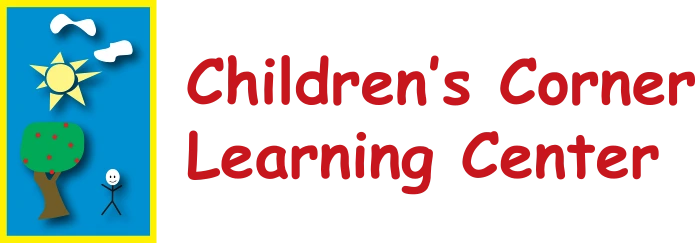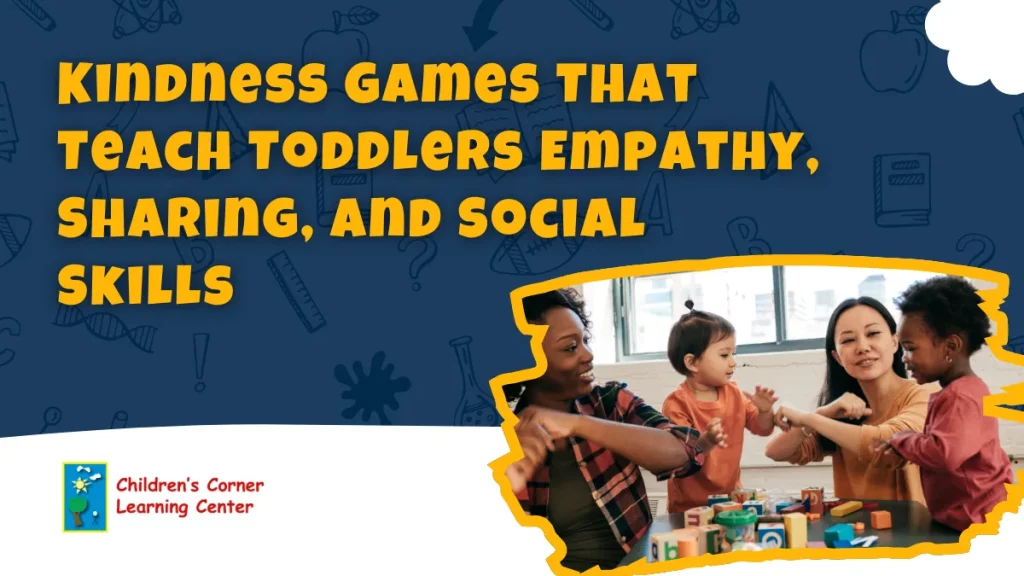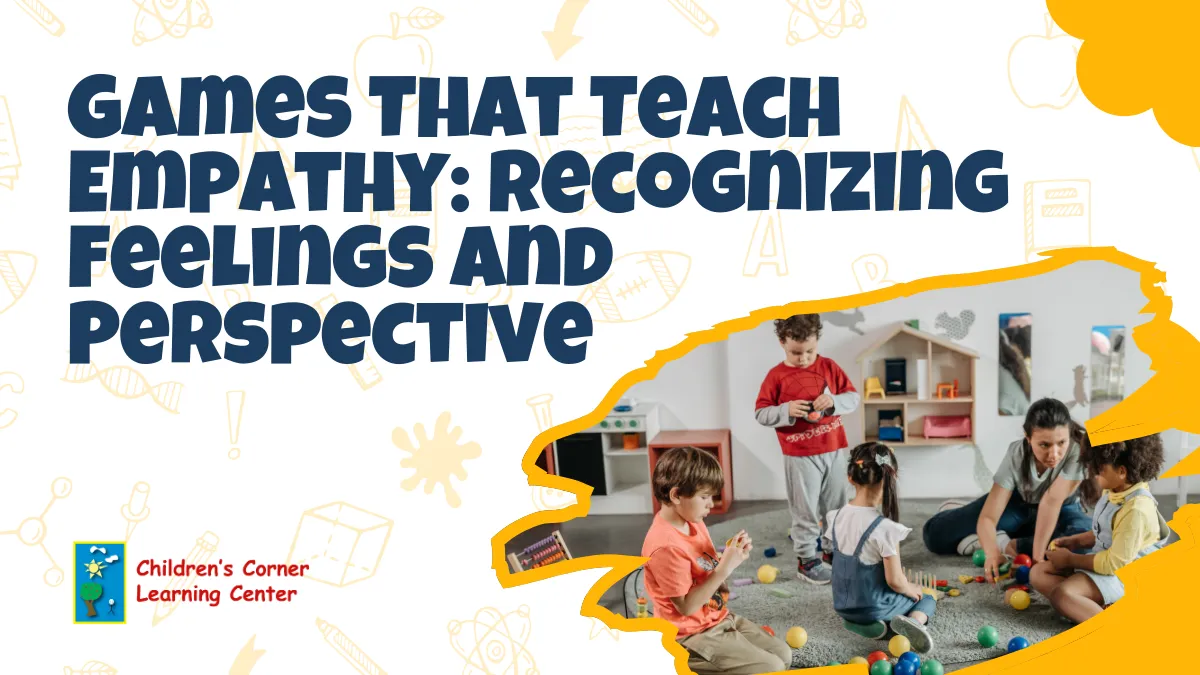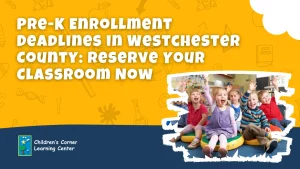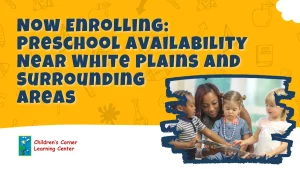Kindness games introduce simple, structured ways for toddlers to practice empathy, sharing, and respectful communication. Using familiar materials such as puppets, picture cards, and soft toys, these activities model caring language, turn-taking, and noticing others’ feelings. Short routines help children learn to offer help, wait for a turn, and celebrate peers’ efforts with specific praise.
Visual cues and scripted prompts guide participation and reduce frustration. Cooperative tasks, such as passing a compliment card or delivering a “kindness ticket,” build confidence and strengthen classroom community. With clear boundaries and consistent follow-up, these games support social problem-solving and positive behavior in daily routines.
Engaging Games That Teach Toddlers Empathy and Cooperation
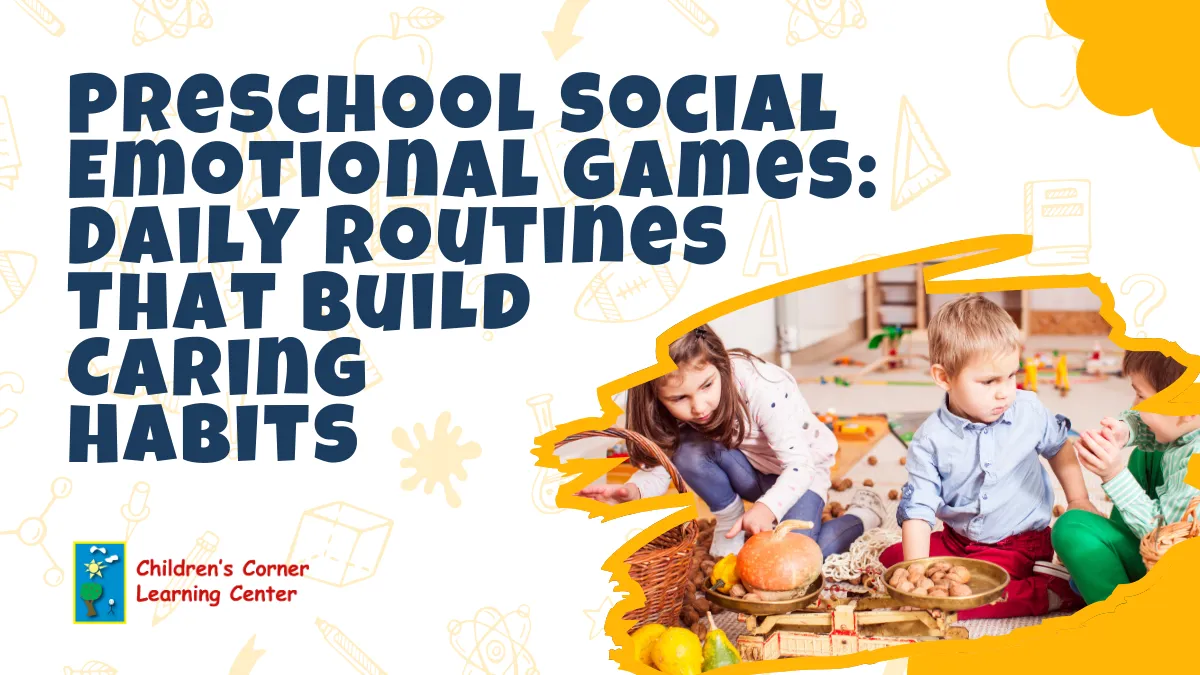
Short, predictable games help children practice caring language, notice feelings, and share materials during everyday transitions. The routines below use clear visuals, small groups, and simple scripts to support participation.
Hello Circle Compliments
Begin the day with names and specific praise to set a positive tone.
- Materials: Name cards, a soft “compliment ball.”
- Steps: Pass the ball, say a peer’s name, and share one concrete compliment.
- Prompts: “Thank you for helping at clean-up,” “I liked your gentle hands.”
This routine strengthens belonging, models respectful talk, and encourages attentive listening.
Kindness Dice
Prompt small helpful actions that can be completed in under a minute.
- Materials: Large foam die labeled with picture cues.
- Actions on the die: Offer a toy, hold the door, say please, share space, help tidy, invite to play.
- Steps: Roll, read the cue together, complete the action, and give a thumbs-up.
Children link instructions to action, practice following directions, and experience quick success.
Feelings Freeze With Emotion Cards
Pair movement with emotion identification to build self-awareness.
- Materials: Music player, emotion cards showing happy, sad, calm, worried, and excited.
- Steps: Move while music plays; freeze when it stops; choose a card and show that feeling with a face or pose.
- Language: “My body looks calm,” “I feel excited.”
The game supports emotion labeling, body regulation, and perspective taking.
Sharing Station With Limited Materials
Teach taking turns by design with a small set of high-interest items.
- Materials: Two to three tools, a sand timer, and “my turn” mats.
- Steps: Place tools at the station; children use a timer, then pass to the next child on a mat.
- Visuals: Turn cards that move from red to green.
Learners practice waiting, passing, and requesting with words rather than grabbing.
Help-A-Friend Task Cards
Invite children to complete simple classroom jobs that benefit peers.
- Materials: Picture cards for tasks such as fetching tissue, pushing in chairs, delivering notes, and watering plants.
- Steps: Draw a card, complete the task, and return the card to the board.
- Reflection: “I helped by…” with a brief check mark chart.
Children experience responsibility, see the effect of helpful actions, and build pride in contribution.
Games That Teach Empathy: Recognizing Feelings And Perspective

Structured play helps children notice emotions, consider others’ needs, and choose caring responses. The activities below use simple visuals, short scripts, and clear roles to guide practice.
Emotion Matching Memory
Pair real faces with emoji or icon cards to connect expressions to feeling words.
- Materials: Photo cards, emoji cards, small mats.
- Steps: Lay cards face down. Children flip two, name the feeling, and keep the pair if it matches the photo to the emoji.
- Prompts: “What might make someone feel this way?” and “How could we help?”
The game supports attention, vocabulary, and early perspective-taking.
Puppet Problem-Solving Scenarios
Use puppets to model conflict and repair in short, predictable scenes.
- Materials: Two puppets and prop cards for common issues.
- Scenarios: Waiting for a turn, spilled blocks, torn page, loud voices.
- Steps: Adult acts out the problem, pauses, and invites children to choose a kind solution card.
- Prompts: “What could the puppet say?” and “What action would be helpful?”
Children practice language for apology, offering help, and checking feelings.
How Can We Help Picture Prompts
Match a need to a helpful action using large photo cues.
- Materials: We need cards showing a friend upset, shoes untied, a water spill, and a heavy bin; action cards such as fetching a tissue, holding the bin, or inviting to play.
- Steps: Display one need card and three action choices. Children select and act out the best fit.
- Language: “I can help by…”
This routine links observation to action and reinforces practical empathy.
Photo Feelings Hunt Around The Room
Invite movement while connecting body signals to feelings.
- Materials: Post photos at child height, and use clipboards with small checklists.
- Steps: Give a prompt such as find calm. Children locate a matching photo and copy the face or pose.
- Prompts: “Where do you see worry?” and “Show calm with your body.”
Children practice emotion recognition and regulation through imitation.
Role-Play Turn Taking With Simple Scripts
Rehearse polite requests and responses with visual cue cards.
- Materials: Two high-interest items, script cards for May I have a turn, After me, and Thank you.
- Steps: Child A requests, Child B responds using the card, timer runs, item passes, both say thank you.
- Coach: Model eye contact, calm voice, and gentle hands.
This activity builds confidence with prosocial language and fair turn-taking routines.
Cooperative Games For Toddlers: Turn Taking And Shared Goals
Cooperative play helps toddlers practice waiting, sharing space, and working toward a typical result. The games below use clear visuals, small groups, and short steps to support successful participation.
Pass The Smile
- Materials: A soft ball, name cards.
- Steps: Say a peer’s name, make friendly eye contact, roll the ball, and share a smile or short greeting.
- Focus: Warm connection, name recognition, gentle hands, and positive openings for group time.
Build-Together Block Challenge
- Materials: Blocks, a simple picture card showing a tower or bridge.
- Steps: Children place blocks in turn, matching the picture or planning aloud.
- Prompts: “Your turn to add one,” “Where should this block go?”
- Focus: Turn-taking, planning, and celebrating a shared structure without competition.
Parachute Lift And Roll
- Materials: Small parachute or large sheet, light foam balls.
- Steps: Children grip handles, lift together on a count, then roll balls around the edge without dropping them.
- Prompts: “Up on three,” “Slow roll to a friend.”
- Focus: Whole-group coordination, listening for counts, and safe movement in shared space.
Team Clean-Up Relay
- Materials: Picture labels on bins and floor spots showing where items belong.
- Steps: Each child chooses a picture card, returns matching items to the labeled bin, and then high-fives a teammate.
- Prompts: “Find this picture and match it.”
- Focus: Responsibility, visual matching, and quick cooperation during transitions.
Puzzle Pairs: Find Your Matching Piece
- Materials: Two-piece puzzles or cards split into halves.
- Steps: Each child holds one half, searches for the matching partner, and completes the picture together.
- Prompts: “Show your half. Who has the other?”
- Focus: Peer approach skills, problem solving, and brief shared success.
Implementation Tips
- Keep groups small, demonstrate first, and post visual rules at child height.
- Use sand timers for turns, ensure pieces are large and non-choking, and provide seated options.
- Reinforce teamwork with specific praise, such as “You waited for the count” and “You helped your friend finish.”
Visual Supports And Materials
Consistent visuals and well-chosen materials make kindness games clear, inviting, and safe. The tools below help children understand expectations, take turns, and celebrate caring behavior.
Picture Cue Cards And Kindness Tokens
- Use simple images to prompt actions and recognize positive choices.
- Prepare cards to help a friend, offer a toy, invite to play, and thank you.
- Print at a large size, laminate, and place on rings for easy access.
- Pair each prompt with a small token or sticker to acknowledge follow-through.
- Model one card at a time, then let children choose a prompt for the group.
First-Then Boards And Timers
- Support transitions and turn-taking with clear, predictable sequences.
- Show the first game, then clean up, or first wait, then your turn, using photos.
- Add a sand timer or visual countdown for 30 to 90 seconds as appropriate.
- Place a stop-and-go card at stations to signal the availability of materials.
- Review the board aloud before starting and point back to it during play.
Puppets, Soft Props, And Social Scripts
- Provide safe tools for practicing voices, gestures, and problem-solving.
- Stock two or three puppets, light scarves, and a soft ball for greeting games.
- Post short scripts at child height. May I have a turn? Thank you.
- Keep a small mirror nearby so children can see calm faces and friendly eyes.
- Store props in a labeled basket and clean soft items regularly.
Labeled Bins, Boundary Mats, And Floor Spots
- Organize spaces so expectations are visible and movement is safe.
- Use photo-and-word labels on bins; match pictures on shelves for quick cleanup.
- Place boundary mats or painter’s tape to show where to sit, stand, or hold the parachute.
- Add floor spots around stations to reduce crowding and support personal space.
- Prepare duplicates of high-interest items to shorten waits and prevent conflicts.
Safety And Care Basics
- Choose age-appropriate materials and keep hygiene routines consistent.
- Select non-toxic supplies and pieces larger than choke-tube size.
- Wipe cards and props after sessions; wash hands before and after group play.
- Check for wear, loose parts, or sharp edges and replace as needed.
- Keep first aid and incident forms accessible, and follow posted classroom guidelines.
Conclusion
Kindness grows when caring behaviors are practiced in short, consistent games. The routines in this guide help toddlers notice feelings, use polite words, wait for a turn, offer help, and celebrate peers. Clear visuals, small-group structure, and simple scripts keep expectations visible so every child can participate confidently. With predictable materials and safety steps, these activities strengthen empathy, self-regulation, and cooperative problem-solving that carry into daily classroom life and home routines.
See how kindness is modeled and practiced in our classrooms. Call (800) 933 7757 or book a visit at https://www.childrenscornergroup.com/book-a-tour/.
